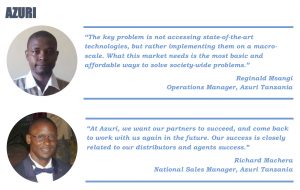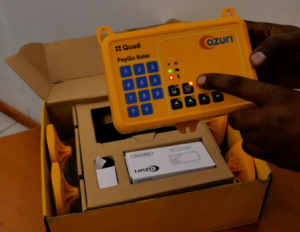Branch
Select your branch
Interview with Azuri: Off-Grid Solar Product Supplier
Having spun off from Eight19, a solar-cell manufacturing company, Azuri has had an exciting journey in the off grid solar market (OGS) market. Established as one of the leading companies in sub-Saharan Africa, Azuri worked in partnership with Shreecom, a telecom company, for almost two years before setting up their independent branch in Tanzania. Azuri’s operations manager, Mr. Msangi, and national sales manager, Mr. Machera, shared their views on the Tanzanian OGS market, highlighting the strengths of the company and outlining future challenges.
What is the range of products supplied by Azuri? How do these compare to your competitors?
The key differentiator between Azuri and other off-grid solar providers is our ability to deliver high-quality products with cutting-edge technology at affordable prices. The ‘Smart-home’ system included in Azuri’s product provides a strong technological advantage over all other solar products in the African market. It features an artificial intelligence component which allows the system to ‘learn’ from the customer’s usage patterns and manage the power supply accordingly. By pressing the smart-home button, the system can be used to automatically dim the lights when they are required to run for long hours. This saves energy and therefore, provides longer hours of illumination.
Azuri’s business model for product distribution is also quite distinguished from those of other companies in the Tanzanian OGS market. Villages are very close-knit communities. While the entry barrier for marketing products in a new village is very high, many households in the village would quickly endorse the product once it is accepted and successfully utilised by a few households. At Azuri, our strategy is to recruit local agents from target villages through our local distributors and pass on our expertise to them. This gives them the confidence to promote off-grid solar products and technologies in their villages. This unique business model of partnering with local distributors across various regions enables Azuri to effectively leverage our distributors’ personal network. It ensures we don’t incur heavy costs of setting upour own distribution channels and infrastructure within the local communities from scratch.
What is your impression of a typical consumer base here in Tanzania? Are people welcoming solar power?
Customers in remote areas are very well educated about different solar products. They have started comparing the range of products from different suppliers visiting their communities. It is very obvious that the awareness campaigns by Tanzania Renewable Energy Association (TAREA) have come a long way and people have become aware about the various benefits of off-grid solar cells. Empowered with knowledge about different solar products, customers are now in a position to negotiate for reliable products and affordable deals for solar-powered appliances. Providers in the OGS market must have good quality products and attractive packages to maintain a competitive edge in the market.
Do you envision your products having an impact on the socio-economic development of the local communities that you work with?
Since Azuri works closely with local distributors and agents, we are effectively generating employment for local sales agents and revenue for our distribution partners. Our success is closely related to our distributors’ and agents’ success. By sharing our technical and business knowledge and expertise with our agents and distribution partners, we have not only built a successful company and distribution network, but have also nurtured people in our communities.
We also build strong personal connections with our local customers through our distributors and agents. In fact, there was once a lady who travelled miles from her village all the way to Azuri office in Kenya to reward a customer care agent with home-grown bananas for their assistance in times of need and the benefits they received from the OGS systems. We now have an entire team dedicated to customer care.
How is the Tanzanian market split across various suppliers? What is your strategy for maintaining a competitive edge in the market?
OGS is a nascent market in Tanzania. Over the past few years, we have found that it is important to align our activities with government agendas and with the agricultural sector. Sales in the OGS market tend to fluctuate with agricultural seasons, peaking around harvest times. Cashews are a major export crop and an important source of income for households from South-east Tanzania. With the recent government subsidy on cashew plantations, cashew-producing households can now improve their standards of living and afford more elaborate solar products. The government has recently decided to promote cotton agriculture, hence cotton-farming localities will likely be the next target market for solar products. So, there is a constant inflow of new markets emerging in the ecosystem and hence there is plenty of room for all current players.
The government is strongly dedicated towards rural electrification. The government heavily subsidises the installation of electricity poles in rural areas, such that for each new electricity pole, the villagers pay only $30 while the government pays a heavy cost of $200. In addition, solar-related products, including solar panels and the main battery device for home kits are exempt from import taxes. Additional appliances that come along with OGS systems such as televisions and radios, are not tax-exempted and thus increase the price of the kit. The selective tax-exemption on solar products but not on attached appliances has had significant impact on some of the players in the OGS market. One of the major players in the Tanzanian OGS market, M-KOPA, had to exit the market as their products became unaffordable compared to other competitors who didn’t supply additional appliances as a part of the kit. As a result, Azuri has gained additional market share by leveraging M-KOPA’s old networks and consumer base. This will prove important for Azuri to stay ahead of our competitors over the next few years.
How is your relationship with the government? Does it support young companies working on solar?
The Tanzanian government has been very supportive of the OGS market. However, the selective tax-exemption on solar products but not on attached appliances has been limiting customers’ access to electrical appliances due to high prices. Many OGS system providers, including Azuri, are constantly working with different non-governmental and non-profit organisations to promote dialogue with the government on this issue. However, this has been a difficult endeavour, since the government faces the risk of fostering black markets upon tax exemption and large-scale imports of electrical appliances.
The key challenge here is not access to state-of-the-art OGS technologies but promoting widespread implementation. What this market needs is the most basic and affordable ways to solve society-wide problems. If there was a technology that could provide end-to-end encryption such that these additional appliances could only work when plugged into the OGS system, this would solve a market-wide issue!
Another option would be to partner with companies like StarTimes, that provide a TV network like a set-top box and dishTV to provide affordable deals only with solar-powered TVs using the same home-kit unit to pay. Azuri is working on possibilities of going the next step above just the four lamps and mobile-phone charging OGS home-kits. And to achieve that we would definitely need the government’s support.
Azuri’s Quad PayGo solar system for rural off-grid homes. Quad utilises HomeSmartTM, a unique control system which adapts its output depending on the customers’ energy usage patterns. Source: Benjamin Droguet



